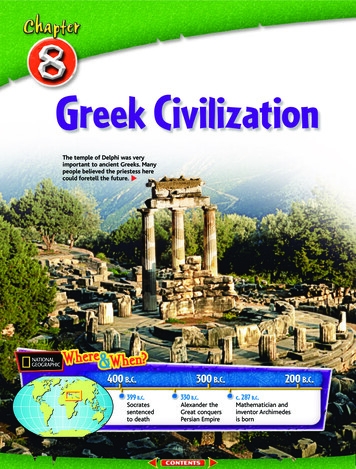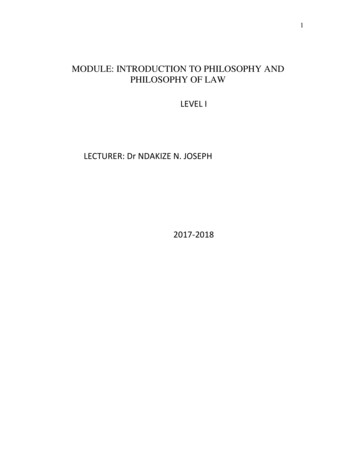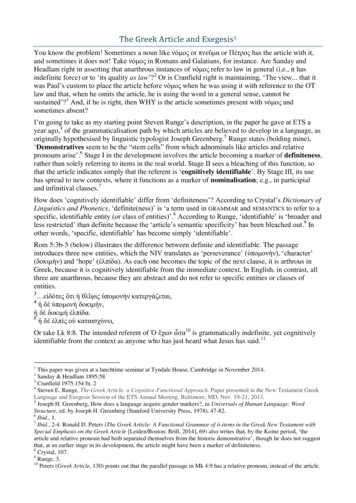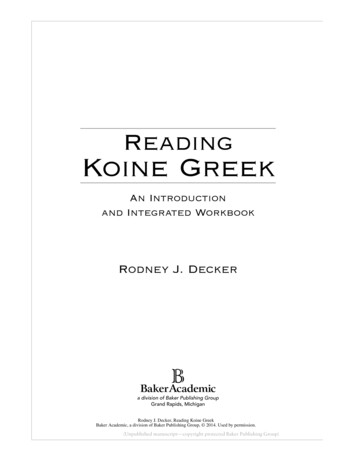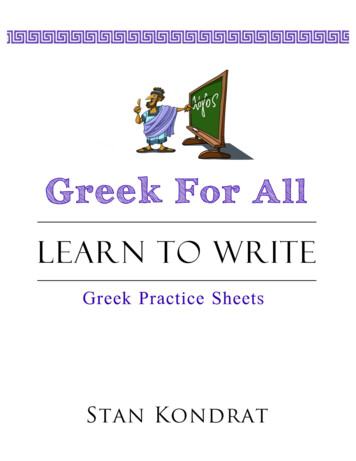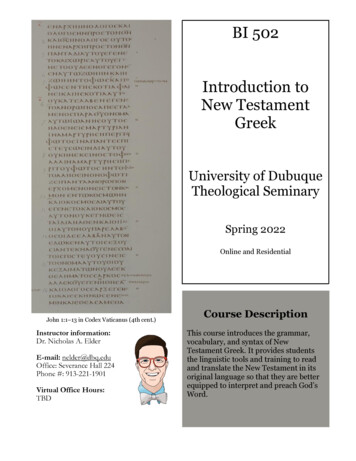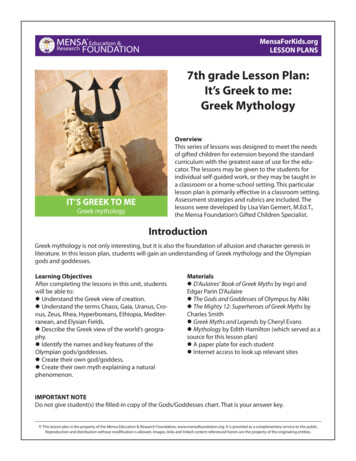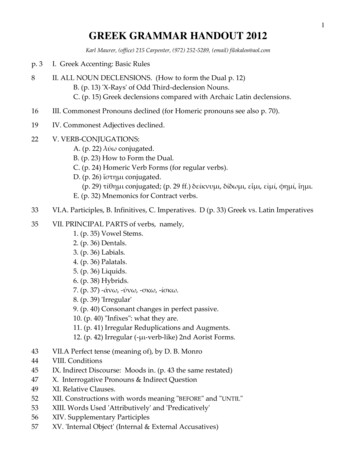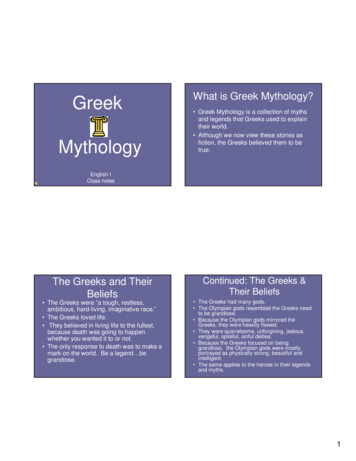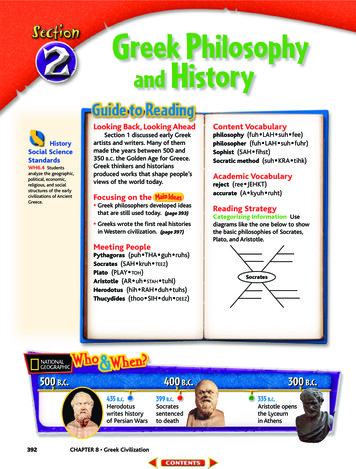
Transcription
Greek Philosophyand HistoryHistorySocial ScienceStandardsWH6.4 Studentsanalyze the geographic,political, economic,religious, and socialstructures of the earlycivilizations of AncientGreece.Looking Back, Looking AheadContent VocabularySection 1 discussed early Greekartists and writers. Many of themmade the years between 500 and350 B.C. the Golden Age for Greece.Greek thinkers and historiansproduced works that shape people’sviews of the world today.philosophy (fuh LAH suh fee)philosopher (fuh LAH suh fuhr)Sophist (SAH fihst)Socratic method (suh KRA tihk)Focusing on the Greek philosophers developed ideasthat are still used today. (page 393) Greeks wrote the first real historiesin Western civilization. (page 397)Academic Vocabularyreject (ree JEHKT)accurate (A kyuh ruht)Reading StrategyCategorizing Information Usediagrams like the one below to showthe basic philosophies of Socrates,Plato, and Aristotle.Meeting PeoplePythagoras (puh THA guh ruhs)Socrates (SAH kruh TEEZ)Plato (PLAY TOH)Aristotle (AR uh STAH tuhl)Herodotus (hih RAH duh tuhs)Thucydides (thoo SIH duh DEEZ)500 B.C.392Socrates400 B.C.300 B.C.435 B.C.399 B.C.335 B.C.Herodotuswrites historyof Persian WarsSocratessentencedto deathAristotle opensthe Lyceumin AthensCHAPTER 8 Greek Civilization
WH6.4.8 Describe the enduring contributions of important Greek figures in the arts and sciences (e.g., Hypatia, Socrates, Plato,Aristotle, Euclid, Thucydides).Greek PhilosophersGreek philosophers developed ideasthat are still used today.Reading Connection What is right? What is wrong?What makes a government good? Read to learn how theancient Greeks tried to answer similar “big” questions.The word philosophy (fuh LAH suh fee)comes from the Greek word for “love of wisdom.” Greek philosophy led to the study ofhistory, political science, science, and mathematics. Greek thinkers who believed thehuman mind could understand everythingwere called philosophers (fuh LAH suh fuhrs).Many philosophers were teachers. OneGreek philosopher, Pythagoras (puh THA guh ruhs), taught his pupils that the universe followed the same laws that governedmusic and numbers. He believed that allrelationships in the world could beexpressed in numbers. As a result, he developed many new ideas about mathematics.Most people know his name because of thePythagorean theorem that is still used ingeometry. It is a way to determine thelength of the sides of a triangle.Who Were the Sophists?The Sophists(SAH fihsts) were professional teachers inancient Greece. They traveled from city toThis artwork shows Greek philosophers involved in adiscussion. Where does the word philosophy come from?CHAPTER 8 Greek Civilization393Scala/Art Resource, NY
Greek PhilosophersSophistsSocratesPlatoAristotleHe was a critic ofthe Sophists. Socratesbelieved that therewas an absoluteright and wrong.He rejected the ideaof democracy as aform of government.Plato believed thatphilosopher-kingsshould rule society.Aristotle taught theidea of the “goldenmean.” He believedobservation andcomparison werenecessary to gainknowledge.He created theSocratic methodof teaching.He described hisvision of the idealgovernmentin his work theRepublic.He wrote over 200books on philosophy and science. Hedivided all governments into threebasic types.His methodsinfluenced the wayteachers interactwith their students.He introduced theidea that government should befair and just.His political ideasstill shape politicalideas today.Thinkeror GroupMain IdeaSophists like Libanius(above) thought thatpeople should useknowledge to improvethemselves. Theybelieved that thereis no absoluteright or wrong.ImportantThey developed theContribution art of public speaking and debate.Influenceon TodayThe importance ofpublic speaking canbe seen in politicaldebates betweencandidates.city and made a living by teaching others.They believed students should use theirtime to improve themselves. Many taughttheir students how to win an argument andmake good political speeches.Sophists did not believe that gods andgoddesses influenced people. They alsorejected the concept of absolute right orwrong. They believed that what was rightfor one person might be wrong for another.The Ideas of SocratesOne critic of theSophists was Socrates (SAH kruh TEEZ).Socrates was an Athenian sculptor whosetrue love was philosophy. Socrates left nowritings behind. What we know abouthim we have learned from the writings ofhis students.394Socrates believed that an absolute truthexisted and that all real knowledge waswithin each person. He invented theSocratic method (suh KRA tihk) of teachingstill used today. He asked pointed questionsto force his pupils to use their reason and tosee things for themselves.Some Athenian leaders considered theSocratic method a threat to their power. Atone time, Athens had a tradition of questioning leaders and speaking freely.However, their defeat in the PeloponnesianWar changed the Athenians. They no longertrusted open debate. In 399 B.C. the leadersaccused Socrates of teaching youngAthenians to rebel against the state. A juryfound Socrates guilty and sentenced him todeath. Socrates could have fled the city, butCHAPTER 8 Greek Civilization(l)Mary Evans Picture Library, (cl)Scala/Art Resource, NY, (cr)Museo Capitolino, Rome/E.T. Archives, London/SuperStock, (r)Reunion des Musees Nationaux/Art Resource, NY
he chose to remain. He argued that he hadlived under the city’s laws, so he had toobey them. He then drank poison to carryout the jury’s sentence.The Ideas of PlatoOne of Socrates’ students was Plato (PLAY TOH). Unlike Socrates,we are able to learn a lot about Plato fromhis writings. One work Plato wrote is calledthe Republic. It explains his vision of government. Based on life in Athens, Platodecided that democracy was not a goodsystem of government. He did not thinkthat rule by the people produced fair or sensible policies. To him, people could not livegood lives unless they had a just and reasonable government.In the Republic, Plato described his idealgovernment. He divided people into threebasic groups. At the top were philosopherkings, who ruled using logic and wisdom.Warriors made up the second group. Theydefended the state from attack.The third group included the rest of thepeople. They were driven by desire, not bywisdom like the first group or courage likethe second. These people produced thestate’s food, clothing, and shelter. Plato alsobelieved that men and women should havethe same education and an equal chance tohave the same jobs.Who Was Aristotle?Plato established aschool in Athens known as the Academy. Hisbest student was Aristotle (AR uh STAH tuhl).Aristotle wrote more than 200 books ontopics ranging from government to theplanets and stars.In 335 B.C. Aristotle opened his ownschool called the Lyceum. At the Lyceum,Aristotle taught his pupils the “goldenmean.” This idea holds that a person shoulddo nothing in excess. For example, a personshould not eat too little or too much but justenough to stay well.Aristotle also helped to advance science.He urged people to use their senses to makeobservations, just as scientists today makeobservations. Aristotle was the first personto group observations according to their similarities and differences. Then he made generalizations based on the groups of facts.Like Plato, Aristotle wrote about government. He studied and compared thegovernments of 158 different places to findthe best form of government. In his bookPolitics, Aristotle divided the governmentsinto three types: Government by one person, such as amonarch (king or queen) or a tyrant Government by a few people, whichmight be an aristocracy or anoligarchy Government by many people, as in ademocracyAristotle noticed that governments runby a few people were usually run by therich. He noticed that most democracieswere run by the poor. He thought the bestgovernment was a mixture of the two.Aristotle’s ideas shaped the wayEuropeans and Americans thought aboutgovernment. The founders of the UnitedStates Constitution tried to create a mixedgovernment that balanced the differenttypes Aristotle had identified.Contrast How didAristotle’s idea of government differ from Plato’s?Web Activity Visit ca.hss.glencoe.com andclick on Chapter 8—Student Web Activity tolearn more about ancient Greece.CHAPTER 8 Greek Civilization395
6.4.6. Compare and contrast life in AthensWH6.4.8Describethe enduringandSparta, withemphasison their rules incontributionsimportant Greekfigures inthePersian andofPeloponnesianWars.the arts and sciences (e.g., Hypatia, Socrates,Plato, Aristotle, Euclid, Thucydides).PLATO AND ARISTOTLEPlato c. 428–347 B.C.Aristotle 384–322 B.C.Plato was from a noble Greek family and had planned a careerin politics. However, he was so horrified by the death of his teacher,Socrates, that he left politics and spent many years traveling andwriting. When Plato returned to Athens in 387 B.C., he founded anacademy, where he taught using Socrates’ method of questioning.His academy drew bright young students from Athens and otherGreek city-states. Plato looked for truth beyond the appearances ofeveryday objects and reflected this philosophy in his writing andteaching. He believed the human soul was the connection betweenthe appearance of things and ideas.Plato and Aristotle—two of the greatest ancient Greekphilosophers—met as teacher and student at Plato’s Academy inPlatoAthens. Aristotle left his home in Stagira and arrived on the Academy’sdoorstep when he was eighteen years old. He remained at Plato’s Academy for20 years, until the death of his teacher. Unlike Plato, Aristotle did not come froma noble family. His father was the court physician to the king of Macedonia. At an earlyage, Aristotle’s father introduced him to the topics of medicine and biology, and thesebecame his main interests of study. Aristotle sought truth through a systematic, scientificapproach. He liked to jot down notes and details about different topics—from weather tohuman behavior—and arrange them in categories. He did not trust the senses’ ability tounderstand the universe.After Plato’s death, Aristotle traveled for about 12 years.He also tutored the future Alexander the Great. Later in hislife, he returned to Athens and opened his own school, theLyceum. He made his school the center for research in everyarea of knowledge known to the Greeks.Aristotle spent 20 years at Plato’s Academy.What present-day careers or subjects of studyrequire lifelong learning?Aristotle396(t)SEF/Art Resource, NY, (b) Scala/Art Resource, NY
WH6.4.8 Describe the enduring contributions of important Greek figures in the arts and sciences (e.g., Hypatia, Socrates, Plato,Aristotle, Euclid, Thucydides).Greek HistoriansGreeks wrote the first real histories inWestern civilization.Reading Connection How would the United States bedifferent if we did not know our history? Read to learn howthe Greeks began to write history.In most places in the ancient world, people used legends and myths to explain theirpast. No one tried to explain the past bystudying events. Then, in 435 B.C., a Greeknamed Herodotus (hih RAH duh tuhs)wrote the history of the Persian Wars.In his book, Herodotus tried to separatefact from legend. He asked questions,recorded answers, and checked the truthfulness of his sources. Although his historyincludes some errors and uses gods andgoddesses to explain some events, manyEuropean and American historians considerhim the “father of history.”Many historians consider Thucydides(thoo SIH duh DEEZ) the greatest historian ofthe ancient world. Thucydides fought in thePeloponnesian War. Afterward, he wrotehis History of the Peloponnesian War.Unlike Herodotus, Thucydides saw warand politics as the activities of humanbeings, not gods. He also stressed theimportance of having accurate facts:Either I was present myself at theevents which I have described orelse I heard of them from eyewitnesses whose reports I havechecked with as muchthoroughness as possible.—Thucydides, History of thePeloponnesian WarIdentify How didThucydides view war and politics?Study Central Need help with Greekphilosophy and history? Visit ca.hss.glencoe.comand click on Study Central.What Did You Learn?Reading SummaryReview the The ideas of Greek philosophers,including Socrates, Plato, andAristotle, still affect modernthinking about education, government, and science. Herodotus and Thucydides areconsidered western civilization’sfirst historians. They believedthat people could understand thepresent by studying the past.1. Who were the Sophists andwhat were their beliefs?2. Before Herodotus, how didGreeks explain the past?4. Science Connection Howare Aristotle’s teachings relatedto the scientific method usedby scientists today? CA 6RC2.3Critical Thinking3. Organizing Information5. Contrast What is differentabout the works of Herodotusand Thucydides? CA 6RC2.2Draw a diagram like the onebelow. Use the diagram toorganize Plato’s ideas about anideal government. CA 6RC2.46.How did the ideasof Greek philosophers affectGreek society? CA HI2.7. Persuasive Writing Do youagree with Plato’s vision of theideal state in the Republic?Write an editorial expressingyour viewpoint. CA 6WA2.5CHAPTER 8 Greek Civilization397
the appearance of things and ideas. Plato and Aristotle—two of the greatest ancient Greek philosophers—met as teacher and student at Plato's Academy in Athens.Aristotle left his home in Stagira and arrived on the Academy's doorstep when he was eighteen years old. He remained at Plato's Academy for 20 years, until the death of his teacher.
